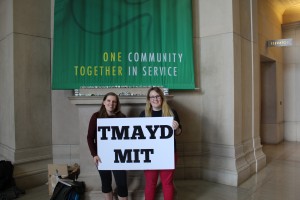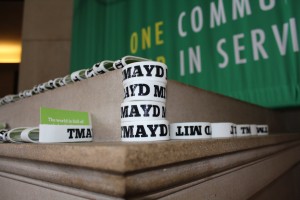Student Asks: Tell Me About Your Day
-
-
slice.mit.edu
- 13
Filed Under
Recommended
Moved by the unity of the MIT community after student losses this year, Lloyd wanted to do something to show support without being prompted by tragedy. “People at MIT are so focused on their work and bettering themselves that we often don’t take the time to show that we care about other people,” says Lloyd, whose white TMAYD wristbands are a hard to miss symbol of community and caring. By wearing the wristbands, students and faculty alike show that they are available to talk or offer support.

Lloyd chose the five letter TMAYD to match up with another acronym popular around MIT—IHTFP. As students know, IHTFP has two different meanings, one positive and one borne out of frustration. Lloyd says she wants TMAYD to be a bridge between the two meanings, encouraging students to connect with others before feeling the dark side of IHTFP.
To launch the TMAYD campaign, Lloyd personally purchased 200 wristbands and began handing them out in Lobby 7 in late March. With the support of a grant from the Arthur C. Smith Memorial Fund--a fund established in memory of the former Dean of Students who was a proponent of building community and supporting student ideas--Lloyd and friends have now handed out nearly 2,000 wristbands. She says the wristbands are already having an impact on camps. “One day we gave out 500 wristbands in Lobby 7 and the next day I had 80 to 90 people come up to me and ask me how my day was,” she says. Lloyd says students and faculty alike have approached her to say they’ve noticed a positive cultural shift on campus because of the bands.
Class of 1942 Professor of Architecture and Professor of Civil and Environmental Engineering John Ochsendorf is one faculty member who’s noticed a shift. Ochsendorf struck up a conversation with Lloyd thanks to the wristbands and invited her to join a faculty meeting to talk about TMAYD.

“Because of the campaign, I have been taking more time in meetings with both students and faculty to talk about broader issues and to make sure that people are doing OK,” Ochsendorf says. “The TMAYD campaign is both simple and powerful.”
TMAYD wristbands can now spotted all around campus, but that doesn’t mean the campaign is complete. Lloyd has secured a grant from the Everett Moore Baker Memorial Foundation to purchase wristbands for members of the Class of 2019 to be distributed during orientation, as a way to re-launch the campaign in the fall. Lloyd even sees the campaign spreading to other colleges, the Greater Boston community, and MIT alumni.
Until then, Lloyd and TMAYD will continue to push for change on MIT’s campus, with lots of support. Says Ochsendorf, “Izzy reminds me that we are a small community. I only met her a few weeks ago and now it seems that we see each other almost every day. She is living proof that change begins one person at a time.”








Comments
george stimmel
Mon, 05/04/2015 11:58pm
Sounds good to me. I have to plead quilty, a half century ago when I was on campus I was mostly preoccupied and if IHTFP was around in my day I didn't, and still don't, know what either of its 2 meanings were.
John Evans
Tue, 05/26/2015 4:16pm
It...sounds good, but somehow I don't really get it? People wear these wristbands and...what, exactly? I don't really understand what the effect is supposed to be. It almost sounds like it's supposed to get people talking about their mental health, but if this had been a thing when I was a student, I CERTAINLY wouldn't have felt like I was allowed to talk to random people about my problems, even if they WERE wearing some wristband.
(Although I DID talk to people at Student Support Services, since that was their job. And they were a great help!)
Veena Trehan
Sat, 05/23/2015 11:31am
I certainly don't want to minimize the effect of bystanders and friends. Yet even more important might be TMATA -- Tell Me About The Administration -- their spending on mental health (and campus sexual assault). MIT touts student-run initiatives, even as they don't answer questions (http://www.createsafecolleges.com provided 5 weeks ago for sexual assault and those in the dailykos article cited above for mental health).
Some critical questions stem from this initiative:
Should an MIT student have to get through an intense curriculum and play therapist too?
And if someone commits suicide should an acquaintance have asked about their day twice more, or however many times it would have taken? Should they potentially feel even more guilty? On some level, it's like that story of a frat guy who was beaten up after questioning a rape. Would it have been better if he protected himself -- was it really "on him"?
Is TMAYD paired with TMATA (Tell Me About The Administration -- how much they are spending on mental health, the wait for counseling)?
A lot of MIT students are truly introverted and socially awkward, maybe even Asperbergers. Probably that's fine -- they'll get programming jobs, work in labs, whatever, and possibly do really brilliant things. Are they losers if they don't want to hear about others' days?
And how many people's grief and sadness can you really process, particularly when your under that kind of stress (quite possibly none) ?
What about the (medical) idea that depression is contagious?
Do students really want other students to guide them through depression? My college friend took Vivarin (like a weak Red Bull, I'm guessing) before two ridiculously hard exams and called her Mom, sobbing -- she wanted to tell an ADULT about her day.
Personally I'm looking for accountability and transparency from the administration on their expenditures, programming, grade curving system -- often brutal, survey results, and other topics on mental health. Because really my experience was #itwasmostlyonthem really, not my truly wonderful friends.
Michael Hale
Fri, 05/22/2015 1:49am
I am a '64 graduate, and IHTFP was certainly around then. Years later, I went to the MIT Museum up the street on Mass Ave, and asked about alumni admittance rate. I didn't have my ring on, nor any MIT ID. The clerk asked "What does IHTFP mean?" I asked if he wanted the G or R version? His response - "No need; the fact that you know the difference proves you went to the 'Tute."
Nicole Morell
Tue, 05/05/2015 10:04am
Hi George, Scroll and you will find the answer: https://wikis.mit.edu/confluence/display/ACRONYMS/Acronyms+-+I
Thanks,
Nicole
Veena Trehan
Fri, 05/22/2015 9:47am
Good student work. Yet I find the administration is downplaying it's role in creating an environment where with widespread depression and anxiety, and 6 suicides in about a year ending in March. I have written of my experiences while pursuing a BSEE '90 and would urge others to ask the following questions regarding mental health programming and results.
http://www.dailykos.com/story/2015/05/19/1385684/-Imposters-at-MIT-Better-Than-Victim-Blaming-Would-Be-Accountability-for-Mental-Health
Bridget
Fri, 05/22/2015 9:34am
Wow, this truly is amazing and inspiring. I would never have imagined that such a culture swing could happen at MIT. Very well done, I hope it goes far!!
Adwoa Boakye
Fri, 05/22/2015 9:24am
Wow, a simple action can have outsized returns. When I first read the summary in the alumni email I thought the writstbands Isabel put together were a new type of tech-based wearable. When I was at MIT I spent time analyzing MIT's political and community culture through a group called Hope in Action under the Technology and Culture Forum. That led me to some insights on how discussion and advocacy works at MIT : http://tech.mit.edu/V132/N26/activism.html .
TMAYD is an amazing fix that fits right into the realm of how MIT moves and shakes. Efforts like Sahar Hakim-Hashemi's Sleep is for the Strong (a great documentary being edited now indiegogo coming soon : see https://www.youtube.com/watch?v=iuLcQ5J5Tuo and http://sleepisforthestrong.com/) and TMAYD are strong indicators that the students and alum are where change is coming from. Support them!
bob simon
Fri, 05/22/2015 12:36am
TMAYD: spent much of the day distributing copies of my new new june issue of my 'south shore puzzle journal'....tiring but satisfying
Veena Trehan
Thu, 05/21/2015 9:45pm
Certainly good work. Yet I am disappointed to read one more article that focuses primarily on students and virtually ignores the role of the administration in creating a highly stressful environment. I recorded my own experiences and some questions all of us should call on the administration to answer about mental health in my recent article: http://www.dailykos.com/story/2015/05/19/1385684/-Imposters-at-MIT-Better-Than-Victim-Blaming-Would-Be-Accountability-for-Mental-Health
Six suicides in a year, including two freshmen? Needlessly high rates of anxiety and depression? We can and should end it.
Kristen
Mon, 05/11/2015 11:26am
Izzy,
I hope you see this. I want to say thank you, this is a powerful thing you are doing. (I read the NPR story on Facebook) I really think that this could easily become a Kickstarter/crowd funding national campaign. I would prefer the sentence to the acronym (don't get old) ;)
This is a beautiful reminder to really see and listen to the people in our lives and the people around us. I hope to hear more about it, and maybe buy a band on in the future. If I can be of help, please get in touch.
Best wishes and keep being a light in the world.
Kristen
Kristen Oberha…
Mon, 05/11/2015 8:19am
As a daughter of an alumni, I always read MIT news (on facebook these days). THIS is the most important story I have read in a longtime. I am the survivor of family and friend suicide attempts, and one of my own. I use that word very purposefully. The people left behind are survivors. Networking with other groups tackling suicide is a way to strengthen the impact of these movements. Hayley's Hope Foundation tries to reach out to people who may be feeling suicidal and connect them to help. Hayley was my daughter's babysitter and she hung herself a few years ago. Her mother started this organization that has events in Mass and Maine. Please contact them and network with other like minded groups and organizations. Keep up the good work!
Walt Crosby
Mon, 05/04/2015 10:59am
Great job Isabel!